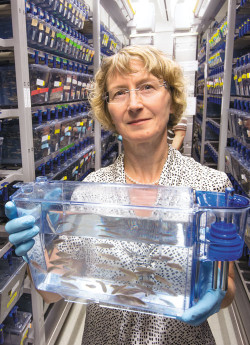
Hani Suleiman, MD, PhD
Instructor of Medicine Hani Suleiman, MD, PhD, will receive a grant from the Zebrafish Models for Pediatric Research Services Cooperative (ZRSC) to study the involvement of certain cytoskeletal proteins in podocyte injury.
The zebrafish, a relative of the minnow, has become increasingly popular in scientific research. The similarity of the zebrafish’s cell physiology to that of humans makes the zebrafish a valuable model for a variety of human diseases. The ZRSC, established by the Children’s Discovery Institute (CDI), funds new projects that utilize zebrafish to understand, diagnose, and develop treatments for some of the most devastating childhood diseases and disorders.
 Dr. Suleiman’s research focuses on podocytopathies, a group of glomerular diseases that affect the kidney’s ability to filter the blood, and that often lead to kidney failure. Healthy podocytes cover the glomerular capillaries with foot processes, extensions that interdigitate with each other “like the fingers of two hands.” Tight regulation of the podocyte’s actin cytoskeleton maintains its elaborate cell shape and, thus, its proper function.
Dr. Suleiman’s research focuses on podocytopathies, a group of glomerular diseases that affect the kidney’s ability to filter the blood, and that often lead to kidney failure. Healthy podocytes cover the glomerular capillaries with foot processes, extensions that interdigitate with each other “like the fingers of two hands.” Tight regulation of the podocyte’s actin cytoskeleton maintains its elaborate cell shape and, thus, its proper function.
With injury or insult to the kidney, a reorganization of the actin cytoskeleton results in foot process effacement (FPE). The podocyte morphology drastically changes and the intricate foot processes disappear, resulting in the glomerular capillaries being covered with a continuous sheet of membrane.
 Suleiman’s proposal will identify the role of the formins FHOD1 and FHOD3 in regulating the podocyte’s actin cytoskeleton using the simple zebrafish pronephros model. The study will also examine the link between FHOD and INF2, the mutation of which causes glomerular disease and which may genetically interact with FHOD.
Suleiman’s proposal will identify the role of the formins FHOD1 and FHOD3 in regulating the podocyte’s actin cytoskeleton using the simple zebrafish pronephros model. The study will also examine the link between FHOD and INF2, the mutation of which causes glomerular disease and which may genetically interact with FHOD.
Analyzing the kidney phenotype of FHOD mutant zebrafish will provide a good base to study it further in mouse models and in human glomerular diseases.
“Using a verity of novel imaging techniques, this study will help us understand the mechanisms behind FPE as part of the podocyte injury response and, consequently, will suggest better diagnostic and therapeutic approaches that are applicable to a wide verity of glomerular diseases, in both adults and children,” says Suleiman.
CDI, a partnership between St. Louis Children’s Hospital and Washington University School of Medicine since 2006, wants to change the way pediatric research is done by encouraging researchers to “ask bold questions and take bold risks to uncover answers.”

WU Zebrafish Facility, one of the largest and most automated in the world. Pictured here is Lilianna Solnica-Krezel, who assisted in development of the facility. Photo credit from source.wustl.edu
The one-year awards, up to $10,000, are to be spent at ZRSC core facilities: Fish Facility (FF), Genome Technology Access Center (GTAC), Genome Engineering and iPSC Core (GEiC), WU High Throughput Screening Core (HTS), Molecular Vectors Core (MVC), WU Center for Cellular Imaging (WUCCI), and the Protein & Nucleic Acid Chemistry Laboratory (PNACL).
More on the importance of the zebrafish in medical research can be found here.